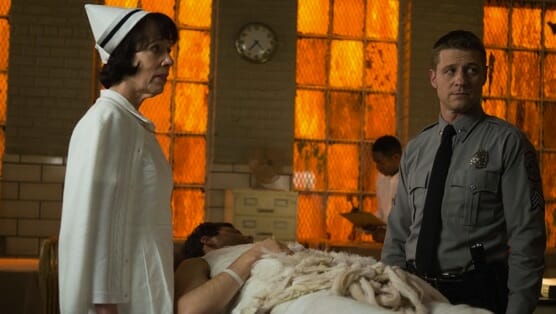
I’d be lying if I said I counted down the minutes to the return of Gotham. The mid-season finale, like many of its episodes, left me with little more than a sense of bewilderment. I couldn’t decide if the show was bad or somewhere in the ever-growing class of “mid-reputable,” and I certainly had no idea if it was worth my time, or yours.
So in the weeks without Gotham, I’ve rarely missed it. In fact, I nearly dreaded its return, I had become so frustrated with its obvious potential, but lack of execution. What last night’s hour, “Rogue’s Gallery,” did was bring me down to earth. It reminded me that absence, which is so often said to make the heart grow fonder, can also unfairly sour the mind.
Gotham’s eleventh episode showed me, when I most needed showing, why this Batman-less drama is worth hanging around for. The flaws, stiff acting, subpar writing, overabundance of characters, remain (and all reared their heads in this episode), but “Rogue’s Gallery” proved that, when Gotham focuses and simplifies its narrative, it is (at the very least) wholly entertaining, and one of the better ways to spend your Monday night.
The best addition to come from the fall finale, surprisingly, was Gordon’s demotion to security guard duty at Arkham (also Morena Baccarin, which I have to include, or run the risk of losing my nerd cred). The inclusion of DC’s infamous asylum seemed like an easy way for the writers to add some crazy to Gotham’s continually confusing concoction of camp and disturbing, extremely serious violence. Gordon in Arkham brought the crazy, but also confined the detective-turned-security guard in a way he hadn’t for the first ten episodes. The confinement allowed the storyline to slow down and focus, and forced Gordon to stay on the investigation, rather than meander about town. Ultimately, it gave us one of the series’ tightest stories, and one of its best, combining clever twists with legitimate consequence (finally!) which gave this hour more punch than many that have come before.
On top of that, this week’s villain, who I’ll keep from the record to avoid any spoilers, appears to be here to stay, at least for one more episode. I have been a proponent of multiple episode storylines from the beginning, which I thought we were going to finally get with the introduction of Zsasz, only to have him relegated to a slightly more idiosyncratic mob lackey. This time around, though, the writers look primed to have a true villain whose story takes multiple hours to conclude. I, for one, am hoping that this trend will carry on through the rest of the season, as it only helps to build the “legend,” as Fox loves to describe it. In the pages of DC’s comics, Gordon’s outlook and temperament are shaped, like many cops, by the cases he’s worked, most of which were encounters that hung around for weeks or months. Though the exact timetable is rarely given in an episode, when the villain has been restricted to a single episode, it’s made their impact on Gordon seem minimal at best, a fleeting aberration in his daily fight against the city’s corruption. But these cases need to shape who Gordon is to become, someone who has seen the darkest sides of Gotham, to such an extent that when a man dons a cape and cowl and starts fighting crime, Gordon sees him as an ally rather than a fool.
On the other side of Two-Face’s coin (sorry) was a continuation of the grand mob war storyline brewing in the background, and occasionally front and center, in Gotham. Thus far, the mob stories have bored me. The reason being that the outcome seems inevitable, with Fish’s death and Penguin’s rise, making the in-between meaningless (something the show as a whole has struggled to keep itself from becoming at times). Of course, I could be proven wrong, but little has been given that would lead me to consider an alternative outcome to this point. “Rogue’s Gallery” did give nice airtime to Butch (Drew Powell), Fish’s right-hand man who has been relegated to banal tough-guy scenarios until now. And, despite providing little substance for much of the episode, Butch’s story gave one of the best sequences the show has ever had, to close out episode eleven. Thanks to stellar writing and acting, plus beautiful directing from Oz Scott (whose work shined throughout), the closing moments of “Rogue’s Gallery” comes in high on the list of the show’s smartest, most provocative scenes.
?Really, Gotham couldn’t have kicked off its second half much better than this. While not a perfect episode by any stretch, the eleventh installment reinvigorated me, and I imagine many viewers, reminding us that when the show cuts the fat and focuses on its main story, it can be easier to overlook all the rough edges. If the writers continue down the path set forth in “Rogue’s Gallery,” good things could be in store for Gothamites. For the first time since the show’s pilot, I’m genuinely excited for the next episode to come and, for the first time ever, I sit clock-in-hand, counting down the minutes.
Eric Walters is a Detroit-based freelance writer and regular contributor to Paste. For more of his TV musings, follow him on Twitter.